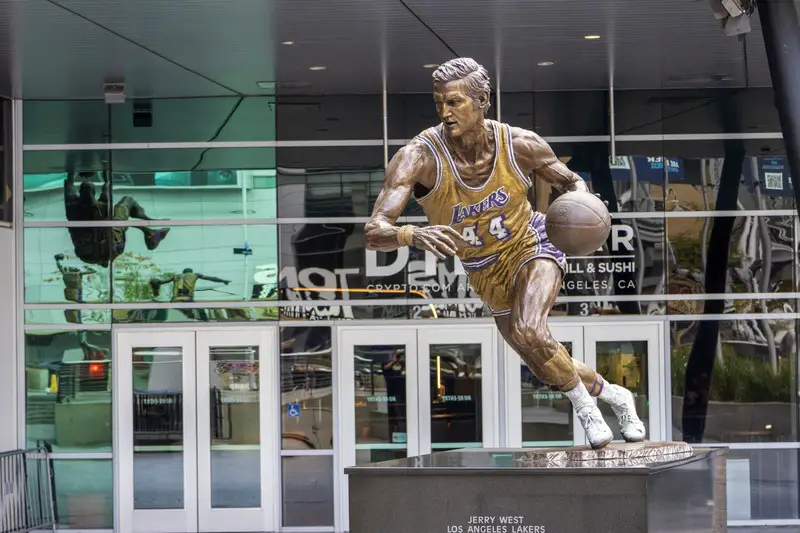Jerry West, a basketball icon known as “Mr. Clutch” and widely believed to be the player depicted in the NBA’s logo, passed away on June 12, 2024, at 86. West’s remarkable career spanned over six decades as a player, coach, and executive, making an indelible impact on the sport.
West’s silhouette has long been associated with the NBA logo, although the league never officially confirmed it. “I’m just part of the game,” West said in an interview. “I never wanted to be any more than that.” His humility was as legendary as his accomplishments on the court and in the executive offices.
Born in Chelyan, West Virginia, West’s journey to basketball greatness began on a simple hoop nailed to a shed. He led East Bank High to a state title and became a standout player at West Virginia University, where he still holds the record for the highest scoring average.
After winning a gold medal with the U.S. Olympic Team in 1960, West embarked on a storied NBA career with the Los Angeles Lakers. Over 14 seasons, he earned 14 All-Star selections, an NBA championship in 1972, and the NBA Finals MVP award in 1969—the only time a player from the losing team has received the honor. His Lakers teams faced numerous heartbreaks, particularly against the Boston Celtics, but West’s performance remained stellar.
President of the Miami Heat, Pat Riley, reflected on West’s influence: “Jerry was that person for me. He changed my life in ways I could never have imagined.” West’s tenacity and skill earned him the nickname “Mr. Clutch,” a testament to his ability to deliver in critical moments.
West’s contributions extended beyond his playing days. As a general manager, he helped build the Lakers’ “Showtime” dynasty of the 1980s, drafting Magic Johnson and James Worthy and later acquiring Kobe Bryant and Shaquille O’Neal. His executive prowess continued with successful stints at the Memphis Grizzlies, Golden State Warriors, and Los Angeles Clippers.
Adam Silver, NBA Commissioner, praised West’s legacy: “He helped build eight championship teams during his tenure in the NBA—a legacy of achievement that mirrors his on-court excellence.” Silver also acknowledged West’s discomfort with being the league’s logo, noting, “He felt that the logo should stand for something bigger than him.”
West’s influence spanned generations. He played with legends like Elgin Baylor and Wilt Chamberlain and later mentored stars such as Kobe Bryant, Stephen Curry, and Kawhi Leonard. His wisdom and insights were invaluable, earning the respect of both players and executives.
“Jerry would kick (butt) in a way that was so skilled and relentless,” said Riley. “Being in that aura of greatness was mesmerizing.” West’s competitive spirit and drive left an indelible mark on everyone he encountered.
West’s personal struggles were as significant as his professional achievements. In his memoir, “West by West: My Charmed, Tormented Life,” he chronicled his battle with depression and the impact of an abusive father. Despite these challenges, West found solace and success in basketball, becoming one of the sport’s most revered figures.
Tributes poured in from across the sports world. LeBron James, the NBA’s all-time scoring leader, wrote on social media, “Will truly miss our convos, my dear friend! My thoughts and prayers go out to your wonderful family! Rest in Paradise, my guy!”
Michael Jordan also paid tribute, calling West “a friend and mentor—like an older brother to me.” He added, “I admired his basketball insights, and he and I shared many similarities in how we approached the game.”
West’s enduring legacy is reflected in his numerous accolades, including his upcoming third induction into the Naismith Memorial Basketball Hall of Fame. His contributions as a player, executive, and mentor have cemented his status as one of basketball’s greatest icons.
West is survived by his wife Karen, their two sons, and three sons from his first marriage. His life, filled with incredible achievements and personal challenges, is a testament to the power of determination and passion.











